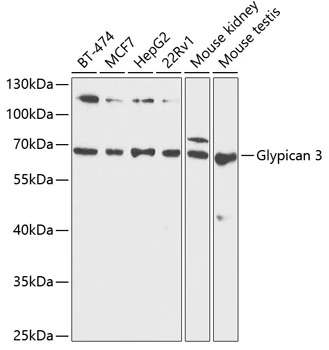![FACS analysis of PFA-fixed HepG2 cells using GTX34762 Glypican-3 antibody [SPM595]. Blue : Primary antibody Red : Isotype control FACS analysis of PFA-fixed HepG2 cells using GTX34762 Glypican-3 antibody [SPM595]. Blue : Primary antibody Red : Isotype control](https://www.genetex.com/upload/website/prouct_img/normal/GTX34762/GTX34762_20200115_FACS_1689_w_23051500_891.webp)
FACS analysis of PFA-fixed HepG2 cells using GTX34762 Glypican-3 antibody [SPM595]. Blue : Primary antibody Red : Isotype control
Glypican-3 antibody [SPM595]
GTX34762
ApplicationsFlow Cytometry, ImmunoFluorescence, ImmunoCytoChemistry, ImmunoHistoChemistry, ImmunoHistoChemistry Paraffin
Product group Antibodies
TargetGPC3
Overview
- SupplierGeneTex
- Product NameGlypican-3 antibody [SPM595]
- Delivery Days Customer9
- Application Supplier NoteICC/IF: 1-2microg/ml. IHC-P: 1-2microg/ml for 30 minutes at RT. FACS: 1-2microg/106 cells. *Optimal dilutions/concentrations should be determined by the researcher.Not tested in other applications.
- ApplicationsFlow Cytometry, ImmunoFluorescence, ImmunoCytoChemistry, ImmunoHistoChemistry, ImmunoHistoChemistry Paraffin
- CertificationResearch Use Only
- ClonalityMonoclonal
- Clone IDSPM595
- Concentration0.2 mg/ml
- ConjugateUnconjugated
- Gene ID2719
- Target nameGPC3
- Target descriptionglypican 3
- Target synonymsDGSX, GTR2-2, MXR7, OCI-5, SDYS, SGB, SGBS, SGBS1, glypican-3, glypican proteoglycan 3, heparan sulphate proteoglycan, intestinal protein OCI-5, secreted glypican-3
- HostMouse
- IsotypeIgG1
- Protein IDP51654
- Protein NameGlypican-3
- Scientific DescriptionCell surface heparan sulfate proteoglycans are composed of a membrane-associated protein core substituted with a variable number of heparan sulfate chains. Members of the glypican-related integral membrane proteoglycan family (GRIPS) contain a core protein anchored to the cytoplasmic membrane via a glycosyl phosphatidylinositol linkage. These proteins may play a role in the control of cell division and growth regulation. The protein encoded by this gene can bind to and inhibit the dipeptidyl peptidase activity of CD26, and it can induce apoptosis in certain cell types. Deletion mutations in this gene are associated with Simpson-Golabi-Behmel syndrome, also known as Simpson dysmorphia syndrome. Alternative splicing results in multiple transcript variants. [provided by RefSeq, Sep 2009]
- Storage Instruction-20°C or -80°C,2°C to 8°C
- UNSPSC12352203

![ICC/IF analysis of MeOH-fixed HepG2 cells using GTX34762 Glypican-3 antibody [SPM595]. Green : Primary antibody Red : nucleus ICC/IF analysis of MeOH-fixed HepG2 cells using GTX34762 Glypican-3 antibody [SPM595]. Green : Primary antibody Red : nucleus](https://www.genetex.com/upload/website/prouct_img/normal/GTX34762/GTX34762_20200115_ICC-IF_1595_w_23051500_385.webp)
![IHC-P analysis of human hepatocellular carcinoma tissue using GTX34762 Glypican-3 antibody [SPM595]. IHC-P analysis of human hepatocellular carcinoma tissue using GTX34762 Glypican-3 antibody [SPM595].](https://www.genetex.com/upload/website/prouct_img/normal/GTX34762/GTX34762_20200115_IHC-P_614_w_23051500_942.webp)
![IHC-P analysis of human hepatocellular carcinoma tissue using GTX34762 Glypican-3 antibody [SPM595]. IHC-P analysis of human hepatocellular carcinoma tissue using GTX34762 Glypican-3 antibody [SPM595].](https://www.genetex.com/upload/website/prouct_img/normal/GTX34762/GTX34762_20200115_IHC-P_615_w_23051500_949.webp)


![ELISA analysis of antigen using GTX60603 Glypican-3 antibody [9C2]. Black : Control antigen 100ng Purple : Antigen 10ng Blue : Antigen 50ng Red : Antigen 100ng](https://www.genetex.com/upload/website/prouct_img/normal/GTX60603/GTX60603_20170912_ELISA_w_23061123_263.webp)